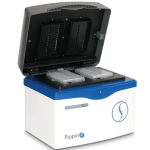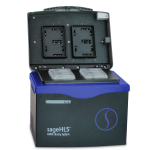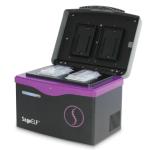Ultra-low input single tube linked-read library method enables short-read second-generation sequencing systems to generate highly accurate and economical long-range sequencing information routinely generate highly accurate and economical long-range sequencing information
June 2020
Authors:
Zhoutao Chen, Long Pham, Tsai-Chin Wu, Guoya Mo, Yu Xia, Peter L Chang, Devin Porter, Tan Phan, Huu Che, Hao Tran, Vikas Bansal, Justin Shaffer, Pedro Belda-Ferre, Gregory Humphrey, Rob Knight, Pavel Pevzner, Son Pham, Yong Wang and Ming Lei
Info:
This study describes the TELL-Seq™ barcode linked read method developed by Universal Sequencing Technology Corp, and presents validation data for the process. TELL-Seq uses a transposase enzyme method that is linked to a bead (TELL-Bead) to insert an 18 bp molecular barcode into illumina sequencing libraries. The method allows economical analysis of haplotype phasing and structural variation in genomes or metagenomic analyses. The workflow requires low DNA input (0.1-5 ng) and is completed in a single tube.
Author Affiliations:
Universal Sequencing Technology, Canton MA
Bioturing, Inc., San Diego CA
University of California, San Diego
Citation:
Genome Research
DOI: 10.1101/gr.260380.119
CRISPR–Cas9/long-read sequencing approach to identify cryptic mutations in BRCA1 and other tumour suppressor genes
October 2020
Authors:
Tom Walsh, Silvia Casadei, Katherine M Munson, Mary Eng, Jessica B Mandell, Suleyman Gulsuner, Mary-Claire King
Info:
In this short report, researchers studying young-onset breast cancer used the SageHLS and HLS-CATCH method to purify high molecular weight targets containing the BRCA1 locus. Affected individuals in this study showed normal sequence based on gene panel and whole exome sequencing. Using long read (~10kb) and low input PacBio® HiFi™ sequencing on the HMW targets the researchers identified an SVA retrotransposon insertion in intronic regions of the BRCA1 locus that are homologous to a region on chr1. They were further able to show how BRCA1 transcription was affected.
Author Affiliations:
University of Washington, Seattle WA
Citation:
Journal of Medical Genetics
DOI:10.1136/jmedgenet-2020-107320
A long-read RNA-seq approach to identify novel transcripts of very large genes
July 2020
Authors:
Prech Uapinyoying, Jeremy Goecks, Susan M. Knoblach, Karuna Panchapakesan, Carsten G. Bonnemann, Terence A. Partridge, Jyoti K. Jaiswal, and Eric P. Hoffman
Info:
Scientists researching muscular disorders present a method for studying gene expression of large RNA transcripts. The PacBio Iso-Seq method allows the sequencing of large transcripts for the identification of isoforms and alternative splicing. However, it has not been amenable to accurate quantitation of expression. Here the scientists combine Iso-Seq with PacBio’s HiFi high consensus accuracy method to show differential gene expression of large transcripts in muscles as well as identify and quantitate previously unannotated ones.
BluePippin was used to size select 5-10kb cDNA fragments for PacBio Iso-Seq library construction, and a second size selection step to remove unligated adapters.
Author Affiliations:
Center for Genetic Medicine Research, Children’s Research Institute, Washington D.C.
Department of Genomics and Precision Medicine, The George Washington University School of Medicine and Health Sciences, Washington, D.C.
National Institute of Neurological Disorders and Stroke, NIH, Bethesda, MD
Computational Biology Program, Oregon Health and Science University, Portland, OR
Department of Pharmaceutical Sciences, School of Pharmacy and Pharmaceutical Sciences, Binghamton University, Binghamton, NY
Citation:
Genome Research
DOI: 10.1101/gr.259903.119.
Fully phased sequence of a diploid human genome determined de novo from the DNA of a single individual
July 2020
Authors:
Ilya Soifer , Nicole L. Fong, Nelda Yi, Andrea T. Ireland, Irene Lam, Matthew Sooknah, Jonathan S. Paw, Paul Peluso, Gregory T. Concepcion, David Rank, Alex R. Hastie, 5 Vladimir Jojic, J. Graham Ruby, David Botstein, Margaret A. Roy
Info:
Researchers at Calico Life Sciences in a collaboration with the platform manufacturers PacBio (sequencing) and BioNano (optical mapping) produced a fully phased de novo assembly of a human genome. 10X Genomics linked-read technology was also used, and a new method is presented that uses Illumina sequencing of flow cytometry-sorted metaphase chmormosomes.
>20KB High-Pass was used on the BluePippin for the construction of SMRTbell library for PacBio RSII sequencing.
Author Affiliations:
Calico Life Sciences LLC, South San Francisco,CA
Pacific Biosciences, Menlo Park, CA
Bionano Genomics, San Diego, CA
Citation:
G3:Genes/Genom/Genetics (Early online)
DOI: 10.1534/g3.119.400995
Highly accurate long-read HiFi sequencing data for five complex genomes
May 2020
Authors:
Ting Hon, Kristin Mars, Greg Young, Yu-Chih Tsai, Joseph W. Karalius, Jane M. Landolin, Nicholas Maurer, David Kudrna, Michael A. Hardigan, Cynthia C. Steiner, Steven J. Knapp, Doreen Ware, Beth Shapiro, Paul Peluso, David R. Rank
Info:
Pacific Biosciences, in conjunction with their research partners, publicly released (in a BioRxiv preprint) the sequences of five complex genomes that were derived using their high-accuracy circular consensus sequencing (the HiFi method, which resequences 15-20kb SMRTbells up to 30X). The genomes include inbred models Mus musculus (house mouse) and Zea mays,(corn) and complex models Fragaria × ananassa (Strawberries) and Rana muscosa (mountain yellow-legged frog). The fifth sequence was a mock metagenomic bacterial community (ATCC MSA-1003).
Three of the libraries use the SageELF for narrow size selections at ~15KB. The BluePippin was used for one genome (beads were used to size select the metagenomic samples.
Author Affiliations:
Pacific Biosciences, Menlo Park CA
Ravel Biotechnology, San Francisco CA
University of California Santa Cruz, Santa Cruz CA
University of Arizona, Tuscon AR
University of California Davis, Davis CA
Cold Spring Harbor Laboratory, Cold Spring Harbor, NY
USDA-ARS, Ithaca NY
Howard Hughes, Medical Institute, University of California Santa Cruz
Citation:
BioRxiv Preprint
DOI: 10.1101/2020.05.04.077180





